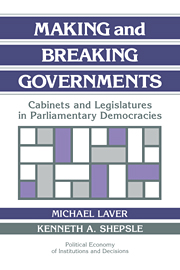Book contents
- Frontmatter
- Contents
- Series editors' preface
- Acknowledgments
- PART I THE CONTEXT
- 1 Theory, institutions, and government formation
- 2 The social context of government formation
- 3 The government formation process
- PART II THE MODEL
- PART III EMPIRICAL INVESTIGATIONS
- PART IV APPLICATIONS, EXTENSIONS, AND CONCLUSIONS
- References
- Index
2 - The social context of government formation
Published online by Cambridge University Press: 06 January 2010
- Frontmatter
- Contents
- Series editors' preface
- Acknowledgments
- PART I THE CONTEXT
- 1 Theory, institutions, and government formation
- 2 The social context of government formation
- 3 The government formation process
- PART II THE MODEL
- PART III EMPIRICAL INVESTIGATIONS
- PART IV APPLICATIONS, EXTENSIONS, AND CONCLUSIONS
- References
- Index
Summary
The political process that dominates our discussion in the rest of this book involves a set of politicians in a parliamentary democracy, each motivated to achieve some objective or another, competing and cooperating among themselves to form a government. The hopes and fears, aims and aspirations of each politician are fulfilled to a greater or lesser extent depending on the outcome of this process.
Before we can develop any systematic analysis of this crucial aspect of democratic politics, we must be explicit about our assumptions. In this chapter, therefore, we elaborate assumptions on a range of matters relevant to the making and breaking of governments in parliamentary democracies. These include the aims, aspirations, and rationality of key actors; the institutional process by which a government is formed; the manner in which actors forecast the likely consequences of having different governments in power; and collective decision making both between and within parties. We begin with perhaps the most fundamental assumptions of all, which have to do with the hopes and fears of politicians and the rational calculus that they use to make decisions.
THE MOTIVATIONS OF POLITICIANS
Those writing on the politics of government formation tend to assume one of two things about the fundamental motivations of politicians involved in political bargaining. Some assume that politicians are concerned above all else to get into office – and that they will say and do whatever is necessary to achieve this. In their search for power, politicians may make policy promises either to each other or to the electorate but, on this interpretation, such policies are promoted for purely instrumental reasons.
- Type
- Chapter
- Information
- Making and Breaking GovernmentsCabinets and Legislatures in Parliamentary Democracies, pp. 18 - 42Publisher: Cambridge University PressPrint publication year: 1996
- 3
- Cited by

